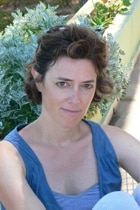About Michela Wrong

Michela Wrong
Contact Michela
She joined Reuters news agency in the early 1980s and was posted as a foreign correspondent to Italy, France and Ivory Coast. She became a freelance journalist in 1994, when she moved to then-Zaire and found herself covering both the genocide in Rwanda and the final days of dictator Mobutu Sese Seko for the BBC and Reuters. She later moved to Kenya, where she spent four years covering east, west and central Africa for the Financial Times newspaper.
In 2000 she published her first book, “In the Footsteps of Kurtz”, the story of Mobutu’s rise and fall, which won a PEN prize for non-fiction. Her second book, “I Didn’t Do It For You”, which focused on the little-written-about Red Sea nation of Eritrea, came out in 2005 and was hailed as a “gripping political thriller” by Monica Ali.
Her third book, published in 2009, was “It’s Our Turn to Eat”, which tracks the story of Kenyan corruption whistleblower John Githongo, who sought refuge in her London flat. Boycotted by Nairobi bookshops terrified of being sued, it became an underground bestseller in Kenya, distributed by local churches, radio stations and non-governmental groups and debated in town hall meetings. Described as reading “like a cross between Le Carre and Solzhenitsyn”, it was named as one of the Economist’s “best books of 2009” and was shortlisted for the Orwell Prize. The book has been optioned by the pan-African film studio Restless Global.
She published her first novel, “Borderlines” in 2015. A legal thriller with a female lawyer protagonist, “Borderlines” focuses on a border dispute between two fictional states in the Horn of Africa. The film rights have been bought by Boondogle Films in South Africa
Her fifth book, “Do Not Disturb”, published in 2021, is a damning portrait of the Rwandan Patriotic Front, from its days as a united band of rebel fighters to today’s era, in which killer squads are dispatched across the world to silence exiled former insiders. The book has prompted a vitriolic backlash on Rwanda’s government-controlled social media, and President Paul Kagame has denounced the author on national television as a foreign agent.


Whether fiction or non-fiction, Michela Wrong’s books on contemporary Africa aim to be accessible to both members of the general public and experts in the field. Backed up by nearly three decades of experience writing about the continent, they have become a must-read for diplomats, aid workers, journalists a{and strategists and regularly feature on the “required reading” lists of International Relations and African Studies courses at university.
She was awarded the 2010 James Cameron prize for journalism “that combined moral vision and professional integrity.” She is regularly interviewed by the BBC, Al Jazeera and Reuters and has published opinion pieces, features and book reviews in the Observer, Guardian, Financial Times, New York Times, New Statesman, Spectator, Standpoint, Foreign Policy magazine, and Conde Nast’s Traveler magazine. She is a consultant for the Miles Morland Foundation, which funds a range of literary festivals, workshops and scholarships for African writers, and an advisor to the Centre for Global Development.
